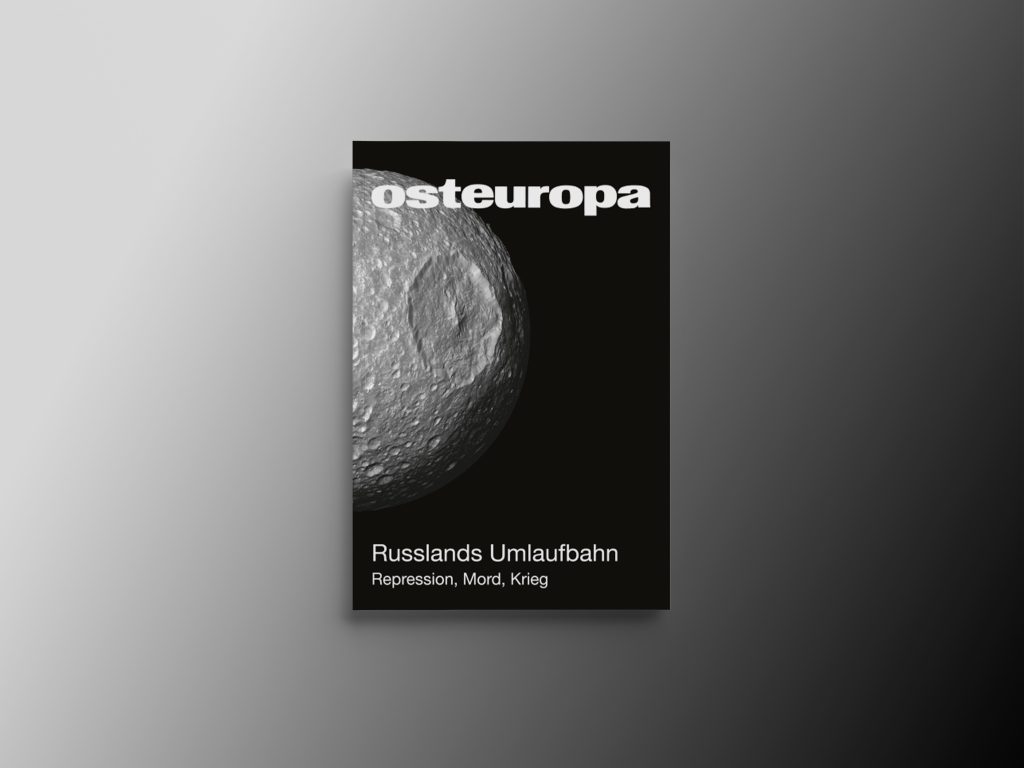‘Russia’s Orbit: Repression, Murder, War’, Osteuropa’s second consecutive issue devoted to the situation in Russia since its attack on Ukraine just over two years ago, documents the escalatory logic driving the regime of Vladimir Putin toward ever-greater excesses of violence both domestically and in its prosecution of the war.
In their editorial, Manfred Sapper and Volker Weichsel describe the ‘apparent paradox’ of latter-day Putinism: ‘the supposedly all-powerful regime is in fact powerless. Only by increasing the levels of violence can it keep itself alive.’

Colonialism
The Ukrainian novelist, poet and essayist Yuri Andrukhovych argues that Russia’s relationship to Ukraine since Peter the Great has been one of colonizer to colonized. He laments ‘how complicated it is to persuade the western academic community of the thesis that Ukraine was a Russian colony’. According to the tenets of decolonial theory, not only must the colony be geographically distant from the seat of colonial power, but the subjugated people must also be, if not nonwhite, then at least non-European.
Andrukhovych points to the Holodomor, the mass starvation of the Ukrainian peasantry in 1932–33, calling it ‘the epitome of predatory colonialism’ in its ruthlessly extractive economic exploitation, planned genocide, and mass resettlement of the depopulated region by representatives of the colonial power.
Though Russia may always have been a colonial empire, Andrukhovych notes that in one key aspect it is untypical: ‘Russia is the only former empire that has attempted to be reborn by reconquering its colonies’. Nor has it ever reckoned with the manifold crimes of its imperialist past: ‘Even today it is firmly persuaded of its right to conquer and subjugate’.
Navalny
In one of four articles in the issue on the life and death of Alexei Navalny, cultural historian Wolfgang Stephan Kissel examines the cultural politics of the opposition leader’s funeral on 1 March 2024.
The events of March 1 were unprecedented in the history of post-Soviet Russia, writes Kissel: ‘In the thirty years since the collapse of the Soviet Union, there had been no large, high-profile funeral that captured the public’s imagination’.
Though the regime, via its surrogates in the Russian Orthodox Church, attempted to pressure Navalny’s family into forgoing a proper Orthodox funeral service, it stopped short of an outright ban. Given that Navalny was a member of the Church who frequently cited scripture in his speeches, doing so would have risked angering the overwhelmingly Orthodox population.
Although the authorities succeeded in shortening the service and preventing a mass influx of the public into the church, they were unable to stop the subsequent procession from becoming a spontaneous anti-government demonstration, in spite of the heavy presence of state security forces.
In his capsule history of Russian public-mourning rituals, Kissel points out that it was the funerals of ‘cultural heroes’ – Pushkin, Dostoyevsky, Mayakovsky and Sakharov, among others – and not of politicians that in the past proved the most socially disruptive, unleashing subversive energies. Here too the pattern held: ‘After this ceremony, Navalny was no longer just an anti-corruption fighter, politician and street activist … but the first Russian cultural hero of the 21st century’.
Georgia
An interview with the literary scholar Zaal Andronikashvili details the delicate situation in Georgia in the run-up to parliamentary elections this October. Thanks to recent electoral reforms that have made it harder for the incumbent party to cement its grip on power, the Georgian Dream party, which has ruled the country since 2012, now runs the very real risk of being voted out.
The elections will take place in the supercharged atmosphere created by the massive street protests in Tbilisi in 2023–4 in response to the government’s Law on Transparency of Foreign Influence, which would force most NGOs to register as ‘organizations carrying the interests of a foreign power’. By passing such a measure – a virtual carbon copy of Russia’s notorious foreign-agent law – the government ‘wants to destroy [Georgia’s] independent civil society’.
The unseen hand behind such maneuvers is Bidzina Ivanishvili: billionaire, former prime minister, founder of Georgian Dream and all-around éminence grise of Georgian politics, who at the end of last year was elected honorary chairman of Georgian Dream as a way of indirectly reasserting his authority.
Since rejoining the political fray Ivanishvili has charted an increasingly authoritarian, populist, pro-Russian course for Georgian Dream, railing conspiratorially against the ‘global party of war’ seeking to drag Georgia into the Ukraine conflict and denouncing the opposition as rootless foreign-educated elites.
Though parliament recently passed the transparency law, the popular movement animating the discontent, which is in favor of EU membership and opposed to Russian vassalage, shows no signs of abating, setting the stage for a showdown in October. ‘Euromaidan, Belarus or a withdrawal of the law – the outcome is still open’, concludes Andronikashvili.
Review by Nick Sywak







